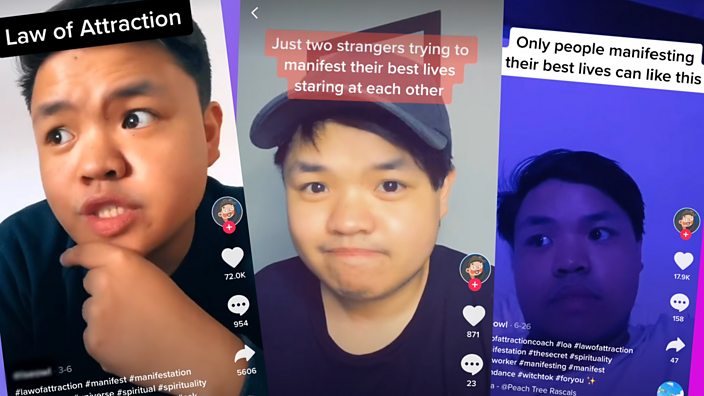Tiktok Gamer Changer

“You’re going to be rich. Your crush is going to text you tonight. Your ex will never get better than you.”
That’s what one TikTok user posted in March. It’s still receiving comments today, 259,000 likes later.
What the user is doing in this video is creating what’s known as a “manifestation,” where you set yourself a goal and either visualise having achieved it or write it down in a journal.
For example, if you wanted to be a pop singer, you’d visualise yourself singing at Wembley Arena or you’d write down “I am a famous pop singer” rather than simply thinking “one day I would like to be a pop singer.”
It comes from New Thought philosophy, a 19th century spiritual movement from the United States that put an emphasis on spiritual healing and metaphysics (the branch of philosophy that deals with the nature of reality, knowledge and truth).
The philosophy’s Law of Attraction theory – that positive or negative thoughts can bring positive or negative realities into a person’s life – lies at the heart of manifesting, where believers are certain they can create their own realities with the right process. In recent years, it found a new audience thanks to the 2006 self-help book The Secret.
#Manifesting has had 334mn views on TikTok – and #manifestation sits at a whopping 4.3bn.

Over lockdown interest in it has surged, in both the UK and in the US, and the number of people searching it on Google went up by 400% in August compared to the numbers Googling pre-coronavirus.
“It’s creepy how my For You page is literally just posts like these,” comments one girl in June.
When you search under these hashtags, most of the videos are either offering tips to people on how to manifest or making claims about what they believe they have manifested for themselves.
What people actually want to manifest into their lives can vary wildly.
One of the top videos at the moment shares “How to manifest having chill parents.”
One girl claims to have manifested a phone stand – another says she manifested clear skin.
A lot of the content, however, focuses on wealth and love; how to make money and how to get that guy or girl to finally notice you.
Some people claim it’s based on science, though many would debunk this. Others might relate to elements of it from “intention setting” in yogic practices, or even Christian, Jewish or Muslim concepts of prayer.
One community powering a lot of manifesting content is #WitchTok, which at 3.7bn views is one of the biggest online witch collectives. Top creators push out videos about manifesting as well as clips on crystal healing, tarot card reading and ancestor worship.
‘I manifested exam results’
Lots of TikTok content creators have seen the viral appeal of manifesting videos and have acquired thousands of views in the process.
Alanis (pictured in header image) is 19 and lives in London. Her video “manifesting for beginners” has had more than 330,000 views and it’s one of the biggest manifesting videos from the UK.
Alanis first encountered manifesting on Instagram last year but was persuaded to actually try it out after watching The Secret over lockdown. The documentary, and its associated book, promotes manifesting with anecdotes of its success but very little fact.
That hasn’t stopped it capturing the imaginations of Gen Z and younger millennials who, via TikTok, have discovered it for themselves.
Alanis believes manifesting has worked for her. “I managed to manifest certain exam results, TikTok followers, collaborations with certain brands, dates and specific text messages,” she says.
When I ask why she attributes that to manifesting and not coincidence or her own hard work, she says “the results were too specific.
“I wanted a pass rate of 85% on one of my tests, normally I only get around 60-70. But since I changed my mindset and manifested it, I got 85%.”
Alanis also claims that she only got to ten thousand followers on TikTok in one week because she manifested that specific number of followers.
Manifesting has no proof but, as a form of spirituality, proof isn’t the point.
‘Positive thinking is a good thing – but not if it becomes delusional’
Psychologist Catherine Sanderson, author of The Positive Shift, says that manifesting is a technique that really is “about the power of what psychologists call mindset. Can mindset matter? Absolutely.”
In researching for her book she came across a number of studies supporting this, including a 2007 Harvard study where women who cleaned hotel rooms were told they were actually exercising while they were cleaning.
That belief led them, four weeks later, to have a lower BMI and lower blood pressure than the ladies who were told nothing.
“The entire placebo effect is very real,” Sanderson says, “so, in that sense, these techniques are an elaborate exercise in the power of perception – and they may ‘work’ because people think they work.”
There can, however, be drawbacks to this kind of thinking.
“There can be downsides if it leads people to stop doing things that are health promoting, like, ‘I don’t need to wear a mask because I’ve convinced myself I can’t get covid’ or ‘I don’t need to save money for a car because I’ve projected I’m already getting one.’
“Some positive thinking is a good thing – physically and mentally. Just not if it crosses the line and becomes delusional.”
In terms of health content, a number of manifesting videos do focus on weight loss and a few don’t seem to be particularly health promoting, like Sanderson says.
One American creator claims to be sharing a “powerful affirmation” to lose weight but does remind viewers it will only work “in combination with exercise and a healthy diet.”
Another American creator simply says: “Manifest being skinny or thicc using this writing method. All you have to do is write down what you want to manifest 33 times for three days.”
For some individuals, manifesting clearly hasn’t brought them what they were so desperate for.
At 1.7m views, a sixteen-year-old British girl’s video is one of the top searches under #manifesting on TikTok.
She states at the top of the video that she’s using the 33×3 method – a process that involves writing out a manifestation thirty-three times, three days running, in the present or past tense as if you have already achieved it.
The pages of her notebook are filled top to bottom with pristine handwriting and she shows her three manifestations; one for wealth, one for weight loss and the last one for a holiday. She promises to update followers every three days with updates.
She does that for four further videos, and then the manifesting updates slip away.
Over six weeks after her viral manifesting TikTok, she makes a video on how her 2020 has been ‘ruined’: “Ate tonnes and put on so much weight and basically ruined all my self confidence.”
There is no concrete evidence for manifesting – which, given it’s a spiritual practice, isn’t necessarily the point here – but scientific research might shed some light on its effectiveness and why it didn’t seem to work for that particular user.
Gabriele Oettingen, an academic and psychologist who has spent her career researching positive thinking, found in her research that it can offer short term benefits but actually be harmful in the long term.
In one study where she monitored a weight-loss programme, “the more positively people fantasise or dream about their success, the less well they do, meaning the fewer pounds they shed.”
Instead of investing time into imagining the achievement of a goal, Oettingen has developed a method she calls WOOP – wish, outcome, obstacle, plan – which instead channels energy into considering what obstacles stand in the way of what you manifest and how to overcome them.
The idea is that over time, you effectively stop dreaming without also considering the realities and challenges facing that dream, and your energy doesn’t get zapped by the ineffective imagining of already having achieved the goal.
‘Fantasies are an expression of our needs’
For Simon, a 28-year-old in Surrey, manifesting has helped him “after lots of struggles with mental health, and I wanted to find a way to ‘heal’ through alternative ways besides just getting therapy.”
He makes videos about manifesting and the law of attraction and is trying to build himself as a digital creator. He’s also a part of a community of spiritual TikTokkers.
“We all feel on a similar level that lockdown has been a spiritual awakening for lots of people around the world.”
He thinks that his manifesting has helped him meet and work with his favourite YouTubers when they’ve come to London.

I asked him why he doesn’t think that’s instead thanks to the success of his own digital strategy.
“At the end of the day, it’s a very simple premise that our thoughts create our reality. If someone believes it’s not real, then that is the reality they are creating for themselves.”
With manifesting growing ever more viral, more and more content creators like Simon are likely to make videos about it.
If people don’t understand the mechanisms of the For You page though, they might not understand that they’re being served up more manifesting content because – in engaging with these videos – they’ve effectively told the app they want to see more of it.
Seeing a video with a manifesting method in it isn’t a sign – it’s the internet doing its maths. But interest in this content shouldn’t be ignored.
“These positive daydreams and fantasies, they need to be taken seriously,” says Gabriele. “We can’t eradicate positive thinking because fantasies are an expression of our needs – meaning that of which we are lacking.”
All these TikTok users looking for love, money and happiness are – by showing what they’d like to manifest – also showing what might be missing from their lives.
Manifesting’s element of positive thinking might well give us the mood boost we need in a time of great anxiety – just so long as it doesn’t stop us achieving the dreams we so desperately want in the first place.



